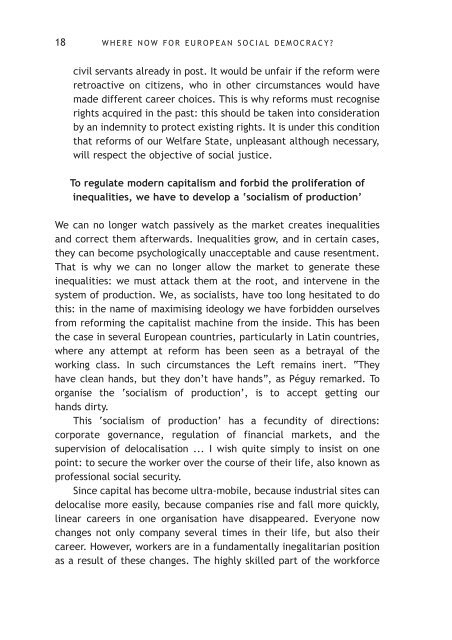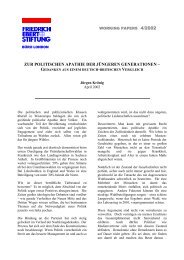Where Now for European Social Democracy? - Policy Network
Where Now for European Social Democracy? - Policy Network
Where Now for European Social Democracy? - Policy Network
You also want an ePaper? Increase the reach of your titles
YUMPU automatically turns print PDFs into web optimized ePapers that Google loves.
18WHERE NOW FOR EUROPEAN SOCIAL DEMOCRACY?civil servants already in post. It would be unfair if the re<strong>for</strong>m wereretroactive on citizens, who in other circumstances would havemade different career choices. This is why re<strong>for</strong>ms must recogniserights acquired in the past: this should be taken into considerationby an indemnity to protect existing rights. It is under this conditionthat re<strong>for</strong>ms of our Welfare State, unpleasant although necessary,will respect the objective of social justice.To regulate modern capitalism and <strong>for</strong>bid the proliferation ofinequalities, we have to develop a ‘socialism of production’We can no longer watch passively as the market creates inequalitiesand correct them afterwards. Inequalities grow, and in certain cases,they can become psychologically unacceptable and cause resentment.That is why we can no longer allow the market to generate theseinequalities: we must attack them at the root, and intervene in thesystem of production. We, as socialists, have too long hesitated to dothis: in the name of maximising ideology we have <strong>for</strong>bidden ourselvesfrom re<strong>for</strong>ming the capitalist machine from the inside. This has beenthe case in several <strong>European</strong> countries, particularly in Latin countries,where any attempt at re<strong>for</strong>m has been seen as a betrayal of theworking class. In such circumstances the Left remains inert. “Theyhave clean hands, but they don’t have hands”, as Péguy remarked. Toorganise the ‘socialism of production’, is to accept getting ourhands dirty.This ‘socialism of production’ has a fecundity of directions:corporate governance, regulation of financial markets, and thesupervision of delocalisation ... I wish quite simply to insist on onepoint: to secure the worker over the course of their life, also known asprofessional social security.Since capital has become ultra-mobile, because industrial sites candelocalise more easily, because companies rise and fall more quickly,linear careers in one organisation have disappeared. Everyone nowchanges not only company several times in their life, but also theircareer. However, workers are in a fundamentally inegalitarian positionas a result of these changes. The highly skilled part of the work<strong>for</strong>ce



